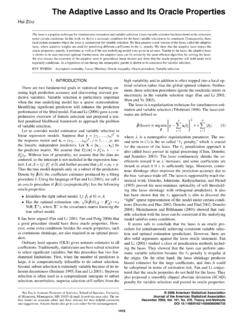Transcription of SCIENTIFIC RECORD KEEPING - National Institutes of Health
1 Guidelines for SCIENTIFIC . RECORD KEEPING . in the Intramural Research Program at the NIH. National Institutes of Health Office of the Director T he progress and excellence of NIH research are dependent on our vigilance in maintain . ing the highest quality of records for every as . pect of the science conducted here. It is impor . tant that every Principal Investigator involved in research at NIH ensures that all SCIENTIFIC staff working with him/her read, understand, and incorporate the Guidelines for SCIENTIFIC RECORD Preface KEEPING into everyday practice.
2 These Guide . lines set forth the general principles underlying RECORD KEEPING that are necessary to support the conduct of good science and address needs aris . ing from the rapid growth of alternative RECORD KEEPING methods, the increasing complexity of research data formats, and the influx of scien . tific trainees with diverse backgrounds. Accord . ingly, the Guidelines should assist both new and experienced investigators as they work together to ensure that all research carried out in the Intramural Research Program is backed up by appropriate SCIENTIFIC RECORD KEEPING .
3 The Guidelines were prepared by the intramural scientists on the NIH Committee on SCIENTIFIC Conduct and Ethics in response to their recognition that not all scientists have received appropriate training in how to maintain excellent SCIENTIFIC records. The SCIENTIFIC Directors have approved the Guidelines. Michael M. Gottesman, Deputy Director for Intramural Research, NIH. 1st Edition December 2008. 1. G ood science requires good RECORD KEEPING . Good RECORD KEEPING promotes both ac . countability and integrity in research.
4 Good re . cords are complete, accurate and understandable to others. Records of research activities should be kept in sufficient detail to allow another Introduction scientist skilled in the art to repeat the work and obtain the same results. Each member of a research group is responsible for his/her own research records while the principal investigator has the ultimate responsibility for the labora . tory's records. It is also helpful to remember that any records of research conducted by NIH. scientists are the property of the NIH.
5 There are at least five reasons why it is impor . tant to keep good records in SCIENTIFIC research: 1. Good RECORD KEEPING is necessary for data analysis, publication, collaboration, peer review, and other research activities. Research records can help you to communicate with members of your research team and col . laborators, brainstorm for ideas, draft or revise your research plans. When it is time to publish or present your research, you need to be able to find the data that support your conclusions and analyses.
6 Editors and reviewers may also re . quest additional data beyond what you submit. After publication, you may need to deposit your data in a data registry and share it with col . leagues who want to repeat your experiments or examine your work more closely. 2. Good RECORD KEEPING is required by the NIH to meet the accepted policies and standards for the conduct of good science. In addition, Federal regulations governing research that includes, but is not limited to, the use of hazardous radioactive or biological mate.
7 Rials, recombinant DNA, products regulated by the Food and Drug Administration, or animals, have additional specific RECORD - KEEPING require . ments. NIH investigators need to be aware of all applicable RECORD - KEEPING requirements which apply to their research and comply with them. 2. 3. Good RECORD KEEPING is necessary to sup . port intellectual property claims. If you are conducting research that may be patentable or involves intellectual property, you need records to support your patent application or to defend your patent or invention if it is challenged.
8 Good research records can prove that you were the first person to conceive of an invention. 4. Good RECORD KEEPING can help defend you against false allegations of research misconduct. Misconduct allegations commonly arise when other scientists are unable to repeat published research. Often the underlying reason for this failure is that the original research was not described in sufficient detail. While good research records cannot prevent you from ever facing allegations of misconduct, they can help you to refute them.
9 5. Good RECORD KEEPING is important in the care of human subjects. High standards of RECORD KEEPING are particularly important for research involving human subjects, be they patients or healthy controls. How investigators maintain records, particularly those involving personally identified and/or sensitive informa . tion, is also important, as are the rules/proce . dures that apply for access to such records. For example, Federal regulations require Institution . al Review Boards (IRBs) to examine, and IRBs in turn require investigators to address before approval, how the confidentiality of records and the privacy of research subjects will be protected.
10 A useful resource for further information on RECORD KEEPING is the Guidelines for the Conduct of Research in the Intramural Research Program at NIH. http://www1. Conduct%20 Research% 3. A laboratory notebook is a RECORD of both physical and mental activity. Laboratory data include tangible data such as gels, slides, photographs, and computer printouts as well as intangibles such as observations and conclu . sions. Data may occur in different forms such Elements of as gels or photos of gels, scans of peaks, and ALL Good quantitation of peaks, all of which are important Laboratory to preserve.

